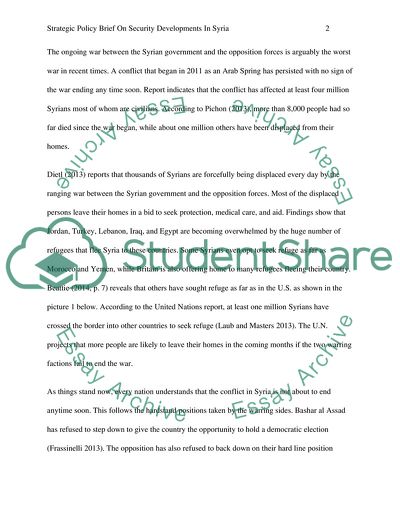Cite this document
(Strategic Policy Brief on Security Developments in Syria Essay Example | Topics and Well Written Essays - 2250 words, n.d.)
Strategic Policy Brief on Security Developments in Syria Essay Example | Topics and Well Written Essays - 2250 words. https://studentshare.org/history/1806954-prepare-a-strategic-policy-brief-on-security-developments-in-syria-for-any-one-of-the-eu-member-states-or-for-the-high-representative-of-the-union-for-foreign-affairs-and-security
Strategic Policy Brief on Security Developments in Syria Essay Example | Topics and Well Written Essays - 2250 words. https://studentshare.org/history/1806954-prepare-a-strategic-policy-brief-on-security-developments-in-syria-for-any-one-of-the-eu-member-states-or-for-the-high-representative-of-the-union-for-foreign-affairs-and-security
(Strategic Policy Brief on Security Developments in Syria Essay Example | Topics and Well Written Essays - 2250 Words)
Strategic Policy Brief on Security Developments in Syria Essay Example | Topics and Well Written Essays - 2250 Words. https://studentshare.org/history/1806954-prepare-a-strategic-policy-brief-on-security-developments-in-syria-for-any-one-of-the-eu-member-states-or-for-the-high-representative-of-the-union-for-foreign-affairs-and-security.
Strategic Policy Brief on Security Developments in Syria Essay Example | Topics and Well Written Essays - 2250 Words. https://studentshare.org/history/1806954-prepare-a-strategic-policy-brief-on-security-developments-in-syria-for-any-one-of-the-eu-member-states-or-for-the-high-representative-of-the-union-for-foreign-affairs-and-security.
“Strategic Policy Brief on Security Developments in Syria Essay Example | Topics and Well Written Essays - 2250 Words”. https://studentshare.org/history/1806954-prepare-a-strategic-policy-brief-on-security-developments-in-syria-for-any-one-of-the-eu-member-states-or-for-the-high-representative-of-the-union-for-foreign-affairs-and-security.


